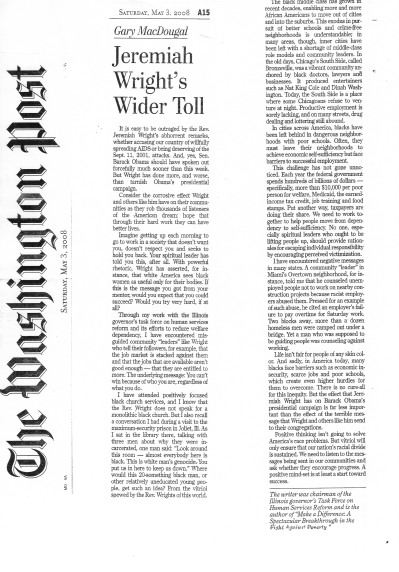The Washington Post
5/3/2008
Copyright The Washington Post Company 2008
by: Gary MacDougal
 It is easy to be outraged by the Rev. Jeremiah Wright's abhorrent remarks, whether accusing our country of willfully spreading AIDS or being deserving of the Sept. 11, 2001, attacks. And, yes, Sen. Barack Obama should have spoken out forcefully much sooner than this week. But Wright has done more, and worse, than tarnish Obama's presidential campaign.
It is easy to be outraged by the Rev. Jeremiah Wright's abhorrent remarks, whether accusing our country of willfully spreading AIDS or being deserving of the Sept. 11, 2001, attacks. And, yes, Sen. Barack Obama should have spoken out forcefully much sooner than this week. But Wright has done more, and worse, than tarnish Obama's presidential campaign.
Consider the corrosive effect Wright and others like him have on their communities as they rob thousands of listeners of the American dream: hope that through their hard work they can have better lives.
Imagine getting up each morning to go to work in a society that doesn't want you, doesn't respect you and seeks to hold you back. Your spiritual leader has told you this, after all. With powerful rhetoric, Wright has asserted, for instance, that white America sees black women as useful only for their bodies. If this is the message you got from your mentor, would you expect that you could succeed? Would you try very hard, if at all?
Through my work with the Illinois governor's task force on human services reform and its efforts to reduce welfare dependency, I have encountered misguided community "leaders" like Wright who tell their followers, for example, that the job market is stacked against them and that the jobs that are available aren't good enough -- that they are entitled to more. The underlying message: You can't win because of who you are, regardless of what you do.
I have attended positively focused black church services, and I know that the Rev. Wright does not speak for a monolithic black church. But I also recall a conversation I had during a visit to the maximum-security prison in Joliet, Ill. As I sat in the library there, talking with three men about why they were incarcerated, one man said: "Look around this room -- almost everybody here is black. This is white man's genocide. You put us in here to keep us down." Where would this 20-something black man, or other relatively uneducated young people, get such an idea? From the vitriol spewed by the Rev. Wrights of this world.
The black middle class has grown in recent decades, enabling more and more African Americans to move out of cities and into the suburbs. This exodus in pursuit of better schools and crime-free neighborhoods is understandable; in many areas, though, inner cities have been left with a shortage of middle-class role models and community leaders. In the old days, Chicago's South Side, called Bronzeville, was a vibrant community anchored by black doctors, lawyers and businesses. It produced entertainers such as Nat King Cole and Dinah Washington. Today, the South Side is a place where some Chicagoans refuse to venture at night. Productive employment is sorely lacking, and on many streets, drug dealing and loitering still abound.
In cities across America, blacks have been left behind in dangerous neighborhoods with poor schools. Often, they must leave their neighborhoods to achieve economic self-sufficiency but face barriers to successful employment.
This challenge has not gone unnoticed. Each year the federal government spends hundreds of billions of dollars -- specifically, more than $10,000 per poor person for welfare, Medicaid, the earned-income tax credit, job training and food stamps. Put another way, taxpayers are doing their share. We need to work together to help people move from dependency to self-sufficiency. No one, especially spiritual leaders who ought to be lifting people up, should provide rationales for escaping individual responsibility by encouraging perceived victimization.
I have encountered negative messages in many states. A community "leader" in Miami's Overtown neighborhood, for instance, told me that he counseled unemployed people not to work on nearby construction projects because racist employers abused them. Pressed for an example of such abuse, he cited an employer's failure to pay overtime for Saturday work. Two blocks away, more than a dozen homeless men were camped out under a bridge. Yet a man who was supposed to be guiding people was counseling against working.
Life isn't fair for people of any skin color. And sadly, in America today, many blacks face barriers such as economic insecurity, scarce jobs and poor schools, which create even higher hurdles for them to overcome. There is no cure-all for this inequity. But the effect that Jeremiah Wright has on Barack Obama's presidential campaign is far less important than the effect of the terrible message that Wright and others like him send to their congregations.
Positive thinking isn't going to solve America's race problems. But vitriol will only ensure that our nation's racial divide is sustained. We need to listen to the messages being sent in our communities and ask whether they encourage progress. A positive mind-set is at least a start toward success.
The writer was chairman of the Illinois governor's Task Force on Human Services Reform and is the author of "Make a Difference: A Spectacular Breakthrough in the Fight Against Poverty."